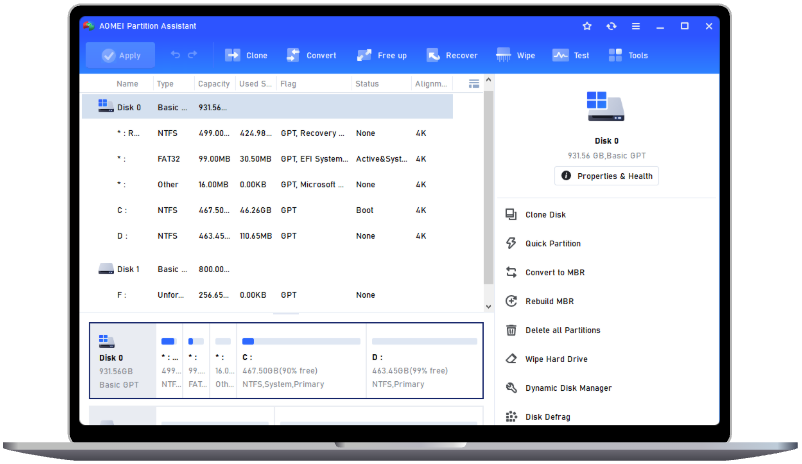The Introduction of SSD: Cons, Pros and How to Choose
This article will show you what SSD (Solid-state Drive) is, the advantage and disadvantage of SSD hard drive, and how to choose right SSD disk for your PC.
What is SSD?
With the high demands of computer speed, most computer users choose SSDs rather than traditional hard drives. So day after day, it has become popular among users and it seems that SSD has become the replacement of traditional hard drives. Then, what is SSD?
SSD is short for Solid State Drive or Solid State Disk which is the type of hard drive. The way for SSD to store and access data is non-volatile memory chips which enables you to retain your information even they have no power. To learn performance of one SSD, you might need to benchmark SSD. But to remember never do SSD defrag as you did to HDD because it doesn’t suitable for SSD. SSD is different from traditional hard drive because there is no moving parts involved in. Meanwhile, secure erase SSD becomes a little different from erasing HDD.
The Advantages of SSD
Compared with traditional hard drives, SSD has no moving parts and drive heads. Yet the SSD partition is same with HDD partition except slight differences. Besides, SSD deals with data though memory chips. These differences make SSD holding many advantages:
▪ Less Power Usage
Power Usage plays an important role for the SSD user’s as there is no power used by motors. Therefore, the drive uses much less energy than the common hard drives. Nowadays with the increasing demands for SSD, the industry has taken steps to improve traditional drive to decrease power usage, but all of them still use more power. SSD will consistently use less power than the traditional drive.
▪ Faster Data Access
Due to SSD doesn’t need to spin up the drive platter or move drive heads, the data can be read from the near drive instantly. In this way the users can access data much faster. This makes a lot of users happy. ▪ ▪ Reliability
It is well acknowledged that hard drive platters are very fragile materials. Sometimes, even the influence of small jarring movements can make the drive be completely unreadable. However, SSD stores all its data in memory chip and there are no moving parts. So the data can’t be affected by the same problem.
▪ No Noise
There is no noise, expect the higher capacity storage spaces that tend to have cooling fans attached.
The Disadvantages of SSD
Compared with traditional hard drives, SSD has more limited write-cycle lifetimes and less storage space which are annoying things for its users. Yet you still got ways to increase SSD lifespan to gain better performance. Besides, SSD is new technology, which makes it more expensive than traditional hard drive.
Learn more differences between SSD and HDD, please refer to SSD vs HDD.
How to Choose a Right SSD?
Computer users can benefit a lot from SSD drive, but most people cost much money without realizing that they don’t need such an expensive SSD drive, maybe a cheaper one is enough to satisfy their requirements. How to choose SSD? The advices are as follows:
1. Supported Trim
Because of the difference between laptop and desktop HDDs, a SSD without trim can offer a remarkable improvement for laptops. However, if you aren’t trim SSD often, and using desktops, you may get troubles.
2.Supported SATA
Most SSDs use the Serial ATA (SATA) interface, but not all use the latest version. If your SATA isn’t the latest version, it will limit the performance of your SSD. Because, SATA I transfers data at 1.5 Gbps, SATA II at 3.0 Gbps, and SATA III at 6 Gbps. To have quick data transfer, you want SATA III, if you think so, you should make sure your computer is SATA III compatible as well. If not SATA III drives will still work as all versions of SATA are backwards-computer. So just make clear that you can’t make full of your SSD if your computer can’t support the latest SATA.
3.ECC Memory
Error-correcting code (ECC) memory can provide your SSD with the capacity of detecting and correcting the common data corruption.
4.High Maximum Speeds
Max read speeds are about 400 MB/second, and max write speeds are around 300/MB. There is no big difference between a litter faster and slower.
SSD has clear advantage over traditional hard drives thanks to no moving parts to wear out. If you have a preference for SSD and would like to install only SSDs on your computer, you may need to know how to clone SSD to SSD when you plan to upgrade your hard drive. After learning so much information about SSD, do you already can't wait to buy one? But before you do that, learn what size of SSD do I need first. As a new technology in disk, SSD is still developing, and it might be the leader of hard drives in the future.

